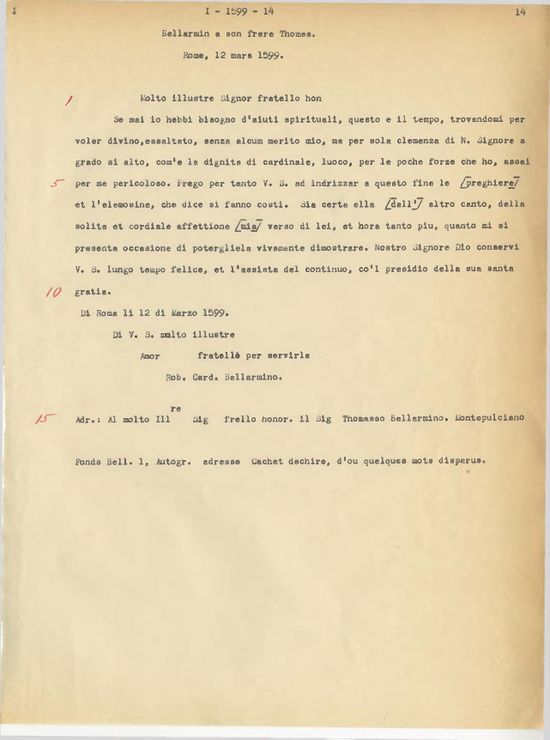Help:EBC Transcription guidelines
| These guidelines are valid for the transcription of the Epistolae Bellarmini Cardinalis only. To read other projects guidelines, please visit their related pages. |
These guidelines are meant to transcibe letters within the Epistolae Bellarmini Cardinalis collection. These letters are typescript transcriptions made by several editors during about 70 years. The edition criteria used by these editors are not known, so texts here published may not always correspond to the original manuscripts.
For these reasons it has been decided to review the texts in order to ease the full-text search.
In these guidelines you will find not only the transcription prescriptions, but also descriptions of other tasks that users have to complete in order to guarantee a good functioning of GATE and to ease the work of other users. These simple and quick tasks must be done within the same page where you will transcribe the letters and their main function is to control and maintain updated the whole advancement of the work.
In any case remember that GATE is a collaborative project, so not all the tasks must be completed by the same user.
These transcription guidelines are available in the following languages:
Transcription guidelines
Accent marks
When accent marks are absent in the typescript, they must be reported within the transcription, e.g.:
“virtu” → “virtù”;“umanita” → “umanità”- etc.
The same style is valid for other languages too (French, Latin etc.).
This choice implies the deletion of accent marks no longer used in modern languages, e.g. "mandarla à me" → "mandarla a me".
Abbreviations
Do not extend abbreviations of honorary titles and salutations. E.g., do not extend “P. C.”, “Ill.ma”, “card.” etc..
Abbreviations of places, names or other entities that could be searched have instead to be extended. e.g.
“Montep.no” → “Montepulciano”;“R.C.B.” → “Roberto Card. Bellarmino”;“R.a” → “Roma”.
This rule applies to any language.
If in doubt, leave abbreviated words as they appear in the original text.
Spaces
Diacrital marks (including punctuation) are always followed by a space; this rule doesn't applies to apostrophes used in articles or prepositions, e.g.:
“ill.mo” NOT “ill. mo”;“V. S.” NOT “V.S.”;“l’altra” NOT “l’ altra”;“chiesa, casa” NOT “chiesa,casa”;“dell’altra” NOT “dell’ altra”.
Other normalisations
- Any other integrations are allowed ONLY to return a more correct text, e.g. restoring concurrence between articles and words, e.g.
“dei numero” → “del numero”. - Outdated forms must be returned to the current use, e.g.
“haver” → "aver",“humanità” → "umanità",“Venetia” → "Venezia",“doppo” → "dopo",“colegio” → "collegio"etc..
Manuscript additions
Manuscript additions made by the editors which correct and improve the text must be directly added to the transcription. Since this is not an edition of original manuscripts, it is not necessary to point these additions out.
Other rules
- Transcribe ONLY the text of the letters, including opening and closing salutations; do not transcribe non trascrivere l’intestazione della lettera apposta dagli editori, luogo di conservazione o altre informazioni fornite dagli editori: tutti questi dati saranno inseriti nel campo Remarks della pagina Index, dove sono riportati anche gli altri metadati delle lettere (l'inserimento dei metadati viene svolto dagli amministratori di GATE).
- Quando in calce alla trascrizione è riportato anche l’indirizzo della lettera, questo va trascritto inserendo prima del testo il tag TEI
<pb/>(per maggiori informazioni vedi TEI help). - Dopo il saluto posto in apertura della lettera, alla fine di ogni capoverso e alla fine di ogni riga di testo componente il saluto finale, va inserito il tag TEI
<lb/>(per maggiori informazioni vedi TEI help). - Non inserire il tag TEI
<lb/>alla fine di ogni riga per riprodurre la distribuzione del testo così come appare nel dattiloscritto. - Le parole troncate troncate a fine pagina vanno riportate per intero nel testo della pagina dove iniziano.
- Nel caso di lettere composte da più pagine, inserire alla fine del testo di ogni pagina (a esclusione dell'ultima) il tag TEI
<pb/>.
Transcription example
Management tasks
To maintain work progress up to date, users must change the transcription status when they finish to proofread the texts.
Further information about proofread tools, see Wiki help#Proofread.
Change transcription status
- when you visit a page not yet proofread, chosen in the [[not proofread letters list, before the text beginning it contains the indication This page has not been proofread;
- this indication informs about the transcription status of that letter; this status is set by users using a toolbar at the bottom of the page in 'Edit' mode;
- when users end their corrections, before saving, they must assign to the page the Proofread status (marked in yellow);
- after setting the new status and saving the page, before the text beginning you can see the new indication This page has been proofread.
Change transcription status categories
When you are in 'Edit' mode within a not proofread page, before the text beginning (or at the end of it), you can read the code [[Category:EBC Not proofread]]. This code represents a category assigned to that page to group it with similar pages, in this case pages containing letters not yet proofread within the Epistolae Bellarmini Cardinalis Project; as any other category, it is shown at bottom of the page (see Wiki help#Categories for further information).
Once users ended their revisions, before saving, they must change this category to [[Category:EBC Proofread]]: this will allow to maintain the not proofread letters list up to date.
Before leaving the page, check if the new category is shown at the bottom of the page and if it is in blue, not red. If it is red, it means the code used is not correct. It is enough to write [[Category:EBC proofread]] (with lowercase p) to generate the error.


